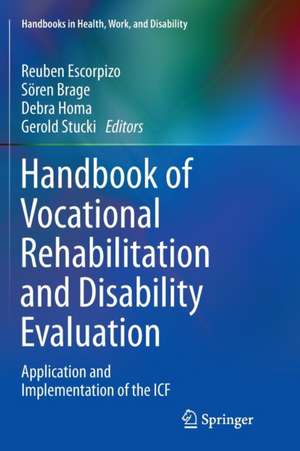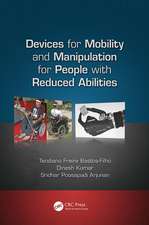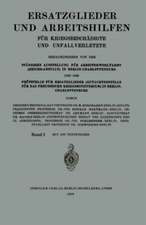Handbook of Vocational Rehabilitation and Disability Evaluation: Application and Implementation of the ICF: Handbooks in Health, Work, and Disability
Editat de Reuben Escorpizo, Sören Brage, Debra Homa, Gerold Stuckien Limba Engleză Paperback – 22 sep 2016
| Toate formatele și edițiile | Preț | Express |
|---|---|---|
| Paperback (1) | 857.61 lei 43-57 zile | |
| Springer International Publishing – 22 sep 2016 | 857.61 lei 43-57 zile | |
| Hardback (1) | 1180.39 lei 43-57 zile | |
| Springer International Publishing – 11 dec 2014 | 1180.39 lei 43-57 zile |
Preț: 857.61 lei
Preț vechi: 902.75 lei
-5% Nou
Puncte Express: 1286
Preț estimativ în valută:
164.16€ • 178.37$ • 137.98£
164.16€ • 178.37$ • 137.98£
Carte tipărită la comandă
Livrare economică 21 aprilie-05 mai
Preluare comenzi: 021 569.72.76
Specificații
ISBN-13: 9783319344003
ISBN-10: 3319344005
Pagini: 582
Ilustrații: XI, 571 p. 37 illus.
Dimensiuni: 155 x 235 x 30 mm
Greutate: 0.81 kg
Ediția:Softcover reprint of the original 1st ed. 2015
Editura: Springer International Publishing
Colecția Springer
Seria Handbooks in Health, Work, and Disability
Locul publicării:Cham, Switzerland
ISBN-10: 3319344005
Pagini: 582
Ilustrații: XI, 571 p. 37 illus.
Dimensiuni: 155 x 235 x 30 mm
Greutate: 0.81 kg
Ediția:Softcover reprint of the original 1st ed. 2015
Editura: Springer International Publishing
Colecția Springer
Seria Handbooks in Health, Work, and Disability
Locul publicării:Cham, Switzerland
Cuprins
Introduction.- Conceptual framework: functioning and disability.- Public health perspective.- Work and employment.- Vocational rehabilitation.- Disability evaluation.- Summary and exercise for chapters 1-5.- State of the Field: VR and DE.- Work disability assessment.- Legal issues.- Job placement.- Musculoskeletal conditions.- Neurological conditions.- Brain injuries.- Mental health and ICF.- Application of ICF to disability evaluation.- Community mental health and ICF.- Occupational disease.- Case Study.- Summary and exercise for chapters 7-17.- ICF-Based Measurement.- Patient-reported outcomes.- Clinician-reported outcomes.- Questionnaire development and testing.- ICF and multimodal rehabilitation.- Case study.- Summary and exercise for chapters 20-23. The Way Forward.- Challenges and opportunities.
Recenzii
“This book is a unique and comprehensive examination of issues related to employment among people with disability, using the important and timely perspective of the International Classification of Function as its organizing framework. … this book is important for broader audiences, including clinicians such as physicians and rehabilitation therapists … . The book is well organized and well written, with clear figures and excellent tables.” (Elliot J. Roth, Doody's Book Reviews, April, 2016)
Notă biografică
Reuben Escorpizo is a Clinical Assistant Professor in the Department of Rehabilitation and Movement Science at the University of Vermont in Burlington VT USA. Prior to moving to Burlington, he was an Assistant Professor in the Department of Physical Therapy at the Louisiana State University Health Sciences Center in New Orleans, LA USA. He is also a senior research scientist at the Swiss Paraplegic Research and the ICF Research Branch in collaboration with the WHO Family of International Classifications in Germany (DIMDI), both located in Nottwil, Switzerland. He conducts research on the International Classification of Functioning, Disability and Health (ICF), patient outcomes, work and employment, work rehabilitation and return to work, spinal cord injury, and arthritis.
Søren Brage is a Chief Medical Officer and Researcher in the Research Section at the Directorate for Labour and Welfare, Oslo, Norway. He is also a practicing medical advisor for the National Insurance Administration. He is a family physician by background, and has been a Senior Researcher at the University of Oslo 1998-2007. He is an expert in Social Insurance Medicine, and President of the European Union of Insurance Medicine (EUMASS/UEMASS). In addition to research on the use of ICF in social insurance, his field of study includes sick leave, disability benefits, disease classifications, medical practice, and international collaboration.
Debra Homa is an Associate Professor in the Department of Rehabilitation and Counseling at the University of Wisconsin-Stout, where she teaches graduate and undergraduate courses in vocational assessment, job placement, and rehabilitation counseling. She has over 25 years of experience working as a vocational evaluator and rehabilitation counselor in a variety of settings including private rehabilitation agencies, non-profit community-based rehabilitation agencies, and hospital-based programs. Her current research interests include the ICF, vocational assessment, and client outcomes in rehabilitation, with an emphasis on employment outcomes.
Gerold Stucki is the Professor and Chair of the Department of Health Sciences and Health Policy at the University of Lucerne, and the Director of Swiss Paraplegic Research and Director of the ICF Research Branch in collaboration with the WHO Family of International Classifications. In this capacity as well as within his role as part of WHO’s ICD-11 Revision Steering Group and as past president of the International Society of Physical and Rehabilitation Medicine (ISPRM), he has been promoting the implementation of the ICF in medicine, rehabilitation and the health sector at large, developing transdisciplinary academic training programs focusing on human functioning, disability and health and has been collaborating with WHO on various projects toward achieving WHO´s vision that “all persons with disabilities live in dignity, with equal rights and opportunities"
Søren Brage is a Chief Medical Officer and Researcher in the Research Section at the Directorate for Labour and Welfare, Oslo, Norway. He is also a practicing medical advisor for the National Insurance Administration. He is a family physician by background, and has been a Senior Researcher at the University of Oslo 1998-2007. He is an expert in Social Insurance Medicine, and President of the European Union of Insurance Medicine (EUMASS/UEMASS). In addition to research on the use of ICF in social insurance, his field of study includes sick leave, disability benefits, disease classifications, medical practice, and international collaboration.
Debra Homa is an Associate Professor in the Department of Rehabilitation and Counseling at the University of Wisconsin-Stout, where she teaches graduate and undergraduate courses in vocational assessment, job placement, and rehabilitation counseling. She has over 25 years of experience working as a vocational evaluator and rehabilitation counselor in a variety of settings including private rehabilitation agencies, non-profit community-based rehabilitation agencies, and hospital-based programs. Her current research interests include the ICF, vocational assessment, and client outcomes in rehabilitation, with an emphasis on employment outcomes.
Gerold Stucki is the Professor and Chair of the Department of Health Sciences and Health Policy at the University of Lucerne, and the Director of Swiss Paraplegic Research and Director of the ICF Research Branch in collaboration with the WHO Family of International Classifications. In this capacity as well as within his role as part of WHO’s ICD-11 Revision Steering Group and as past president of the International Society of Physical and Rehabilitation Medicine (ISPRM), he has been promoting the implementation of the ICF in medicine, rehabilitation and the health sector at large, developing transdisciplinary academic training programs focusing on human functioning, disability and health and has been collaborating with WHO on various projects toward achieving WHO´s vision that “all persons with disabilities live in dignity, with equal rights and opportunities"
Textul de pe ultima copertă
For persons with chronic illnesses and disabling injuries, work prospects--especially for meaningful work with decent conditions--have traditionally been poor. With global efforts from the UN, WHO, ILO, and other bodies focusing attention on this wide-reaching issue, innovative tools are needed to translate large-scale goals into real-world outcomes.
The framework offered by the Handbook of Vocational Rehabilitation and Disability Evaluation highlights the complex challenges and opportunities involved in enabling re-entry into the workforce. Geared to ICF (International Classification of Functioning, Disability, and Health) standards, this timely reference outlines current science-based methods in assessing impairment and capabilities and emerging approaches to management specifically relating to work participation. Separate chapters are devoted to evaluation and rehabilitation guidelines for individuals with brain injury, chronic musculoskeletal pain, mental illness,and other disabling conditions. And the chapters on ICF-based functioning measurement review the data on widely-used clinician- and patient-reported instruments and the recent Work Rehabilitation Questionnaire (WORQ). Featured in the Handbook:
The framework offered by the Handbook of Vocational Rehabilitation and Disability Evaluation highlights the complex challenges and opportunities involved in enabling re-entry into the workforce. Geared to ICF (International Classification of Functioning, Disability, and Health) standards, this timely reference outlines current science-based methods in assessing impairment and capabilities and emerging approaches to management specifically relating to work participation. Separate chapters are devoted to evaluation and rehabilitation guidelines for individuals with brain injury, chronic musculoskeletal pain, mental illness,and other disabling conditions. And the chapters on ICF-based functioning measurement review the data on widely-used clinician- and patient-reported instruments and the recent Work Rehabilitation Questionnaire (WORQ). Featured in the Handbook:
- The impact of chronic disease on work participation and its implications for intervention and management.
- Vocational assessment and job placement.
- Spinal cord injury: vocational rehabilitation and disability evaluation.
- Critical issues for mental health management in vocational rehabilitation.
- Clinician-reported outcome measures: experiences from multicenter follow-up.
- ICF-based tools in rehabilitation toward return-to-work.
Caracteristici
Fills a gap in applying the WHO's ICF in VR teaching and practice Addresses contemporary and emerging issues in vocational rehabilitation and disability evaluation ICF will play major role in upcoming revision of WHO's International Classification of Diseases














